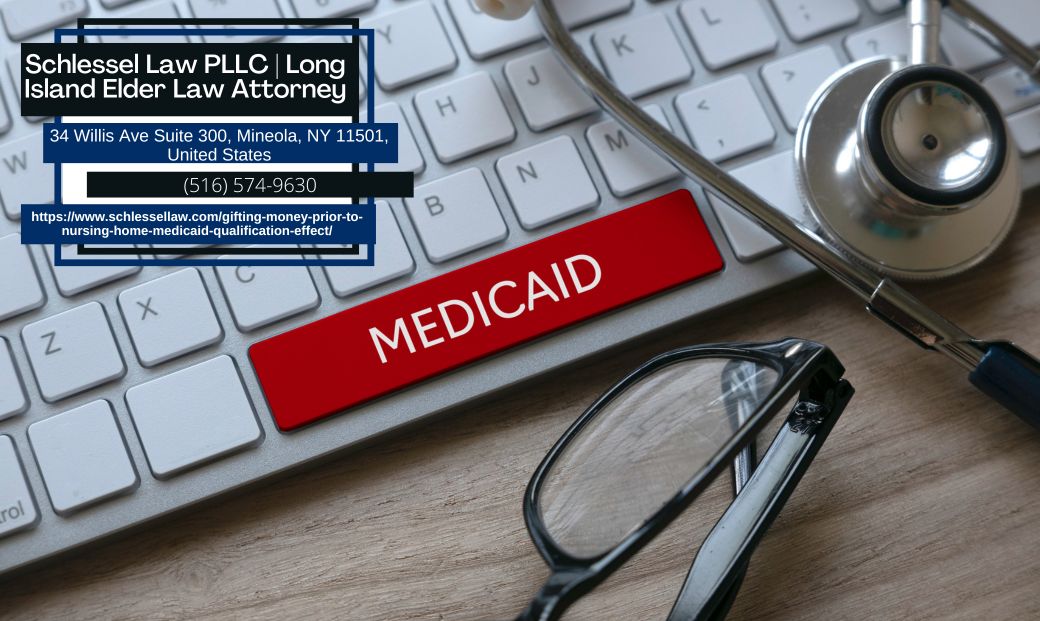Long Island Medicaid planning attorney Seth Schlessel (https://www.schlessellaw.com/gifting-money-prior-to-nursing-home-medicaid-qualification-effect/) from Schlessel Law PLLC offers valuable insights into the critical impact of gifting money on Medicaid eligibility in New York. For individuals planning for long-term care, understanding how and when assets are transferred is crucial to avoid penalties that could affect Medicaid qualification. Seth Schlessel, a seasoned Long Island Medicaid planning attorney, emphasizes the importance of strategic asset management to comply with Medicaid's stringent regulations, especially the five-year look-back period. This advice can help families ensure that they can protect their assets while securing essential healthcare coverage.
Medicaid's five-year look-back period reviews asset transfers made within the five years leading up to a Medicaid application. Improper transfers during this period can result in penalties, including a delay in Medicaid eligibility. Schlessel notes that by working with a Medicaid planning attorney, individuals can mitigate these risks. "Proper planning with the guidance of a Long Island Medicaid planning attorney can help you manage your assets wisely, further ensuring you don’t face unnecessary setbacks when applying for Medicaid," says Seth Schlessel.
Gifting assets can affect Medicaid eligibility in significant ways. Medicaid in New York requires applicants to pass an asset test, which determines whether they fall within the allowable asset limits for coverage. When an individual gifts assets to family members or friends, those assets are subtracted from the individual’s countable assets, which could seem beneficial. However, as Long Island Medicaid planning attorney Seth Schlessel explains, gifts made within the five-year look-back period are scrutinized by Medicaid and could lead to penalties.
The look-back period serves as a safeguard to prevent people from artificially reducing their assets to qualify for Medicaid. Any transfer made for less than fair market value during this period can result in penalties. The penalty is calculated by dividing the amount of money transferred by the average monthly cost of nursing home care in New York. For example, if $50,000 is gifted during the look-back period, and the average monthly nursing home cost is $10,000, the penalty period would be five months of ineligibility for Medicaid benefits.
Schlessel emphasizes the importance of professional guidance in this area, as non-compliant transfers can jeopardize eligibility. Gifting may include common actions such as monetary gifts to family members, paying someone else’s expenses, forgiving loans, or selling assets below market value. Schlessel warns that even well-intentioned acts of generosity can trigger Medicaid penalties if not executed with careful planning. “By understanding the rules and working with a Long Island Medicaid planning attorney, you can protect your assets and further ensure that your loved ones benefit from your financial support without risking your Medicaid eligibility,” Schlessel advises.
To safeguard Medicaid eligibility, Schlessel suggests several strategies, including using Medicaid Asset Trusts or Irrevocable Trusts. These legal tools allow individuals to transfer assets without violating the five-year look-back rule, provided the trusts are structured correctly and established in a timely manner. Medicaid Asset Trusts ensure that the assets placed within the trust are not considered available to the individual when determining Medicaid eligibility. Such trusts must be irrevocable and comply with legal stipulations to protect assets while avoiding penalties.
In addition to trusts, other legal strategies include converting countable assets into non-countable assets through the use of annuities, or spending down excess assets on permissible expenses such as medical bills or home modifications. Schlessel explains that these strategies are vital for maintaining Medicaid eligibility while also ensuring financial stability. “It’s important to think ahead and utilize these tools to protect both your healthcare access and your family’s financial future,” Schlessel says.
Families should not wait until a healthcare crisis occurs to begin planning for Medicaid. By consulting a Medicaid planning attorney such as Seth Schlessel, individuals can protect their assets, avoid penalties, and secure long-term care benefits when needed. Schlessel’s tailored legal strategies can offer peace of mind, helping families safeguard their financial legacies while ensuring access to critical healthcare services.
About Schlessel Law PLLC:
Schlessel Law PLLC is a Long Island-based law firm well-versed in Medicaid planning, estate planning, and elder law. Led by attorney Seth Schlessel, the firm is dedicated to helping families protect their assets and secure their financial futures. Schlessel Law PLLC can offer personalized legal strategies that help ensure compliance with New York Medicaid regulations while preserving assets for future generations.
Embeds:
Youtube Video: https://www.youtube.com/watch?v=YLKRHNFwBX0
GMB: https://www.google.com/maps?cid=7387587768064061142
Email and website
Email: seth@schlessellaw.com
Website: https://www.schlessellaw.com/
Media Contact
Company Name: Schlessel Law PLLC
Contact Person: Seth Schlessel
Email: Send Email
Phone: (516) 574-9630
Address:34 Willis Ave Suite 300
City: Mineola
State: New York 11501
Country: United States
Website: https://www.schlessellaw.com/





